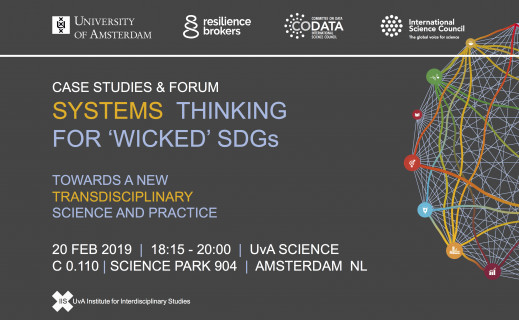The Institute for Interdisciplinary Studies (Univ. of Amsterdam), together with CODATA of the International Science Council (Paris) and Resilience Brokers (London), welcomes you to a public forum on tackling societal, 'wicked' problems like the Sustainable Development Goals (SDGs) through systems thinking and transdisciplinary research approaches.
Addressing the pressing scientific and human issues of the twenty-first century (including climate-change adaptation, urban resilience, infectious-disease outbreaks, sustainable development, disaster-risk reduction) can only be addressed through research that works across disciplines to understanding complex systems, and which uses a transdisciplinary approach to turn data into knowledge and then into policy and societal action. (Hodson 2018)
FORMAT
Case Studies & Public Forum: The panel will explore these issues through three short case studies showing the application of systems approaches to a range of ‘wicked’ contexts, with topics that include:
• integrated-systems modelling tools for regional planning and investment decision making in Accra, Ghana;
• achieving interdisciplinary-data integration through closely-allied domains of research and practice in Medellin, Colombia (e.g., public health, urban resilience and community planning from the pilots of the ISC-CODATA Data Integration Initiative); and
• agent-based modelling with citizen participation for agricultural landscapes (e.g., food production, biodiversity, ecosystems services) in the Netherlands and Tanzania;
• as well as the importance of open- and FAIR-data policies (FAIR data principles: 'findable, accessible, interoperable, reusable'), which can provide numerous developmental and societal co-benefits.
The presenters will walk through projects to show by example how interdisciplinary and transdisciplinary research work (and what the differences between the two are), what the bottlenecks are, how methodologies are designed to be process-driven yet strive to be outcome-focused to inform practice, and how transdisciplinary approaches call for stakeholders to play a more active role in the 'co-production of knowledge', for example, as citizen scientists. Followed by Q&A.
CHAIR
➜ Dr Coyan Tromp, assistant professor and curriculum developer, UvA Institute for Interdisciplinary Studies; author of ‘Wicked Philosophy: Philosophy of Science and Vision Development for Complex Problems' .
SPEAKERS
➜ Dr Emma van der Zanden, lecturer in Future Planetary Studies, UvA Institute for Interdisciplinary Studies; research focus areas: land-use analysis, agent-based modeling, participatory scenario development.
➜ Prof Peter Head (@peterheadCBE), founder & chair of Resilience Brokers, Ecological Sequestration Trust (London); visiting professor in sustainable systems engineering, Bristol University; advisory board, United Nations Global Assessment Report on Disaster Risk Reduction (GAR), UNDRR/UNISDR; former global head of planning & integrated urbanism, Arup (2004-2012).
➜ Prof Barend Mons (@BarendMons), president of CODATA, International Science Council; ambassador & co-founder, GO FAIR International Support & Coordination Office (GFISCO, Leiden); Professor in Biosemantics, Leiden University Medical Center (LUMC).
➜ Dr Simon Hodson (@simonhodson99 / @CODATAnews), executive director of CODATA, International Science Council (Paris); chair, European Commission FAIRdata Expert Group; project director, African Open Science Platform; scientific advisory board, Consortium of European Social Science Data Archives (CESSDA ERIC); co-chair, Group on Earth Observations (GEO) Data Sharing Working Group; project director, ISC-CODATA Data Integration Initiative (with the Infectious Diseases Data Observatory at Oxford University; Public Health England; United Nations University, Resilience Brokers, Ruta-N Medellin .
EVENT DETAILS
Wednesday, 20 February 2019 | 18:15 - 20:00 CET
UvA Science C 0.110 (auditorium), Science Park 904
Free and open to the public with no registration required. Max. room occupancy/capacity: 100
image credit: adapted from ICSU
(1931-2018 ICSU, 'Internationale Raad voor Wetenschappen') ➜ Juli 2018- ISC, 'International Science Council'. Het CODATA, 'Committee on Data for Science & Technology', is een interdisciplinaire, internationale commissie, opgericht door het ICSU in 1966.)






Great to see this!!
[Almost] full house! Thanks to everyone for coming and for the challenging questions that led to a stirring debate about modelling complexity (at times heated, yet always collegial).
"All models are wrong; some are helpful" - Barend Mons quoting George Box;
“Everything should be made as simple as possible but not simpler” - Albert Einstein.
https://image-store.slidesharecdn.com/bf74e2ce-bf7e-405a-b3b5-1dbc8202f3fd-original.jpeg
https://pbs.twimg.com/media/Dz3jsYvXgAAGrJf.jpg
thanks!
No signup; open to the public until the lecture hall fills up (100 max).
I see that it's a public forum, but you do you need to signup if interested in attending?
Hi - Sorry for the confusion! The text used to read, "Addressing the pressing scientific and human issues of the 21st century "; however, the event is indeed on Wednesday evening, 20th February (in the twenty-first century).
Is the event on February 21st as the text suggests? Or on February 20th as the poster suggests?